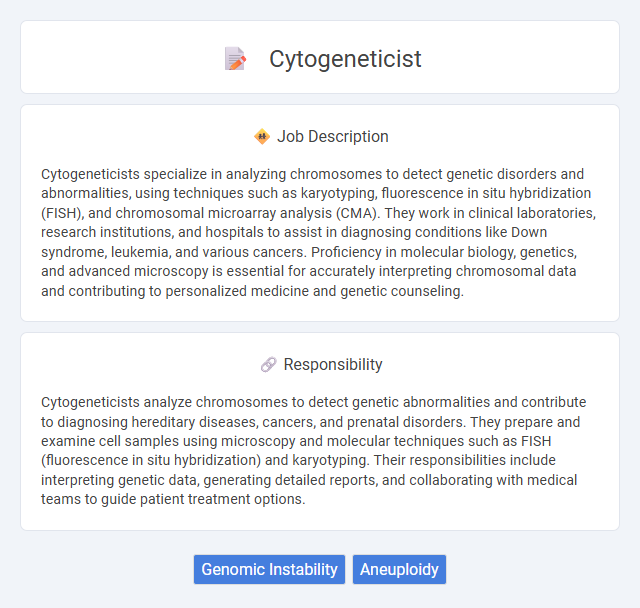
Cytogeneticists specialize in analyzing chromosomes to detect genetic disorders and abnormalities, using techniques such as karyotyping, fluorescence in situ hybridization (FISH), and chromosomal microarray analysis (CMA). They work in clinical laboratories, research institutions, and hospitals to assist in diagnosing conditions like Down syndrome, leukemia, and various cancers. Proficiency in molecular biology, genetics, and advanced microscopy is essential for accurately interpreting chromosomal data and contributing to personalized medicine and genetic counseling.
Individuals with strong analytical skills and a keen interest in genetics are likely to be well-suited for a cytogeneticist role, as the job requires detailed examination of chromosomes to diagnose genetic disorders. Those who are patient, detail-oriented, and comfortable working in laboratory settings may have a higher probability of success in this profession. People who prefer hands-on scientific research and have a background in biology or genetics might find this career both fulfilling and appropriate for their skills.
Qualification
A cytogeneticist must possess a strong background in genetics, molecular biology, and cytogenetics, typically holding a master's or doctoral degree in these fields. Proficiency in laboratory techniques such as chromosome analysis, karyotyping, fluorescence in situ hybridization (FISH), and genomic microarray is essential. Certification from recognized boards, such as the American Board of Medical Genetics and Genomics (ABMGG), enhances employment prospects and validates expertise in clinical cytogenetics.
Responsibility
Cytogeneticists analyze chromosomes to detect genetic abnormalities and contribute to diagnosing hereditary diseases, cancers, and prenatal disorders. They prepare and examine cell samples using microscopy and molecular techniques such as FISH (fluorescence in situ hybridization) and karyotyping. Their responsibilities include interpreting genetic data, generating detailed reports, and collaborating with medical teams to guide patient treatment options.
Benefit
A Cytogeneticist is likely to benefit from a high demand for specialized skills in genetic analysis and chromosome research, contributing to advances in medical diagnostics and personalized medicine. The role may offer strong career stability and opportunities for professional growth within healthcare and research institutions. Access to cutting-edge technology and collaboration with multidisciplinary teams could enhance job satisfaction and expertise development.
Challenge
A career as a cytogeneticist likely involves the challenge of analyzing complex chromosomal data to diagnose genetic disorders accurately. The probability of encountering intricate cases requiring advanced problem-solving skills and attention to detail is high. Adapting to rapidly evolving technologies and interpreting subtle variations in chromosome structure may significantly test a cytogeneticist's expertise.
Career Advancement
Cytogeneticists advance their careers by gaining expertise in chromosomal analysis techniques and specializing in areas such as molecular cytogenetics or clinical genetics. Progression often involves roles like senior cytogeneticist, laboratory director, or research scientist in medical institutions, biotechnology firms, or academic settings. Obtaining certifications from professional bodies like the American Board of Medical Genetics enhances job prospects and leadership opportunities.
Key Terms
Genomic Instability
A cytogeneticist specializes in analyzing chromosomal abnormalities to identify genomic instability, a critical factor in cancer development and genetic disorders. Utilizing techniques like fluorescence in situ hybridization (FISH) and karyotyping, they detect structural variations and aneuploidies that contribute to genome instability. Their work supports personalized medicine by guiding targeted therapies and improving disease prognosis based on chromosomal instability profiles.
Aneuploidy
A cytogeneticist specializing in aneuploidy analyzes chromosomal abnormalities where cells have an abnormal number of chromosomes, such as trisomies or monosomies, which can lead to genetic disorders like Down syndrome or Turner syndrome. Utilizing techniques like karyotyping, fluorescence in situ hybridization (FISH), and comparative genomic hybridization (CGH), cytogeneticists detect and characterize aneuploid conditions in prenatal, postnatal, and oncology samples. Their work supports diagnosis, prognosis, and guiding treatment decisions by interpreting chromosomal imbalances affecting cell function and development.
 kuljobs.com
kuljobs.com